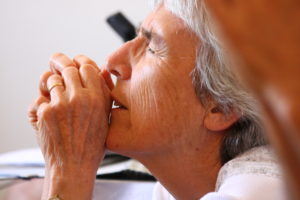On my last post I pointed to the fact that God’s will is made of two constituents, namely, the compulsory will of God and the elective will of God. The former is imposed on us and entails a punishment if left undone. The latter is optional and gives rise to a reward when it is performed.
When compulsion is counterproductive
The simple fact is that there are duties so dear to God that He will not impose them on us, for here coercion would not secure a perfect work. Therefore God invites the lovers discreetly by means of a whisper or a wish, or more so, by a simple revelation of who He is and what He desires.
Peter refers to such fulfillment when he writes:
Shepherd the flock of God which is among you, serving as overseers, not by compulsion but willingly” (1 Peter 5:2).
Obviously God doesn’t want overseers serving Him with long faces, for He knows their achievement would be doomed from the very start. So He is looking for men willing to serve from the heart, knowing they will minister cheerfully as servants to whom a privilege is given. Such overseers will be ready to fulfill their responsibilities meticulously.
Bad publicity
Paul implies the same thing when he talks about giving: “So let each one give as he purposes in his heart, not grudgingly or of necessity; for God loves a cheerful giver” (2 Cor. 9:7). Here Paul makes clear that one should not give because he is obliged to, but rather because he wants to.
King David, understanding the beauty of such giving wrote: “But who am I, and who are my people, that we should be able to offer so willingly as this? For all things come from You, and of Your own we have given You” (1 Chr. 29:14).
Brethren! May God help us to discern between what needs to be imposed and what needs to be offered willingly, for we have had bad publicity enough. What is the point to manufacture unenthusiastic advertisers who tarnish the heavenly glory and discolor the divine rainbows?
God knows from whom He can demand a service, for He knows the hearts of those who love Him unconditionally. Only such will fulfill with gladness that which is imposed. That’s why Jesus could say: “Not my will but yours be done”, and you can be sure His heart was in His words.
Actually only the volunteers will accept orders from the heart, for they are ready to fulfill them and go beyond the requirements. As for the rest, they might grudge, complain and protest. Surely, God wants to avoid such useless scenery.
We need volunteers
“Your people will volunteer freely in the day of Your power” (NASB Psalm 110:3). Thus writes the psalmist and thus the Spirit inspired him.
Where are the volunteers today? We talk of power and revivals but too often come short of their demonstration. As the old man says: “Show me a man who has divine power and I will show you a volunteer.” Surely the psalmist would have said ‘Amen!’ to that.
The heart of God
“My heart goes out to the commanders of Israel, the volunteers among the people; bless the Lord!” (Jdg 5:9). These words uttered by Deborah were but a reflection of God’s heart. Yes brethren! The Ancient of Days goes with the cheerful giver as He went with Ittai and the three mighty men of David. Let us emulate their zeal and desire their willing heart.
The example of Ruth
We have talked about Ittai and the three mighty men of David, but what about Ruth, the great-grandmother of king David? Her story is truly a sweet-smelling aroma sent forth for whoever has the ability to scent the love of a lover.
Her story began in the land of Moab where she was from. There she had married Chilion—one of the two sons of Naomi—while Mahlon, her brother-in-law, had married Orpah.
Now, Naomie was a widow from Ephratah (Bethlehem). Decades before she and her husband had fled to the land Moab when there was a severe famine in Judea. But in the course of time her husband died as well as her two sons, thus living Ruth and Orpah in widowhood as well.
In due time Naomie heard how the Lord had visited His people and that there was provision in her native land. So she was determined to return there, willing to face hardship if needed. But in her love for her daughters-in-law she released them from all responsibilities:
“Go, return each to her mother’s house. The Lord deal kindly with you, as you have dealt with the dead and with me. The Lord grant that you may find rest, each in the house of her husband. So she kissed them, and they lifted up their voices and wept. And they said to her, “Surely we will return with you to your people.” (Ruth 1:8-10).
The benevolence of love
What follows reflects the deep love Naomie had for Orpah and Ruth: “Turn back, my daughters; why will you go with me? Are there still sons in my womb, that they may be your husbands? Turn back, my daughters, go—for I am too old to have a husband. If I should say I have hope, if I should have a husband tonight and should also bear sons, would you wait for them till they were grown? Would you restrain yourselves from having husbands?” (Ruth 1:11-13). Naomie knew too well what the life of a widow was in a foreign land. At all cost she wanted to spare her daughters-in-law from such adversity.
So here again nothing was imposed on Orpah and Ruth. They were both free to return to their respective family and find a husband for themselves, for they were both young and the prospect of a good future was at their reach. So “Orpah kissed her mother-in-law, but Ruth clung to her”?” (Ruth 1:14).
Here again the two degrees of love are being exposed. Orpah obeyed the verbal petition of her mother-in-law, but Ruth volunteered to follow her, for she had heard not merely the utterance of Naomie’s lips, but also the very desire of her heart. So she offered herself, and did it willingly. For love doesn’t seek its own but the well being of the other.
Even when Naomie insisted saying: “Look, your sister-in-law has gone back to her people and to her gods; return after your sister-in-law” (Ruth 1:15). Ruth was adamant:
Entreat me not to leave you, or to turn back from following after you; for wherever you go, I will go; and wherever you lodge, I will lodge; your people shall be my people, and your God, my God.17 Where you die, I will die, and there will I be buried. The Lord do so to me, and more also, if anything but death parts you and me” (Ruth 1:16,17).
Where do I fit in all this? Where is my heart? Can I hear the desires of the Beloved? Or is it that the waves of a turbulent world swallow up His discreet whispers. Or perhaps knowing, I avoid the commitment. After all, nothing is being imposed. So there I stand, free from all obligations.
O wretched blindness! May Love sublime overcome you. May your ease be swallowed up by the fervor of His glory, for soon the day will be over and all opportunities will be passed.
If you think this post can help somebody else you can share it with the options presented bellow.













